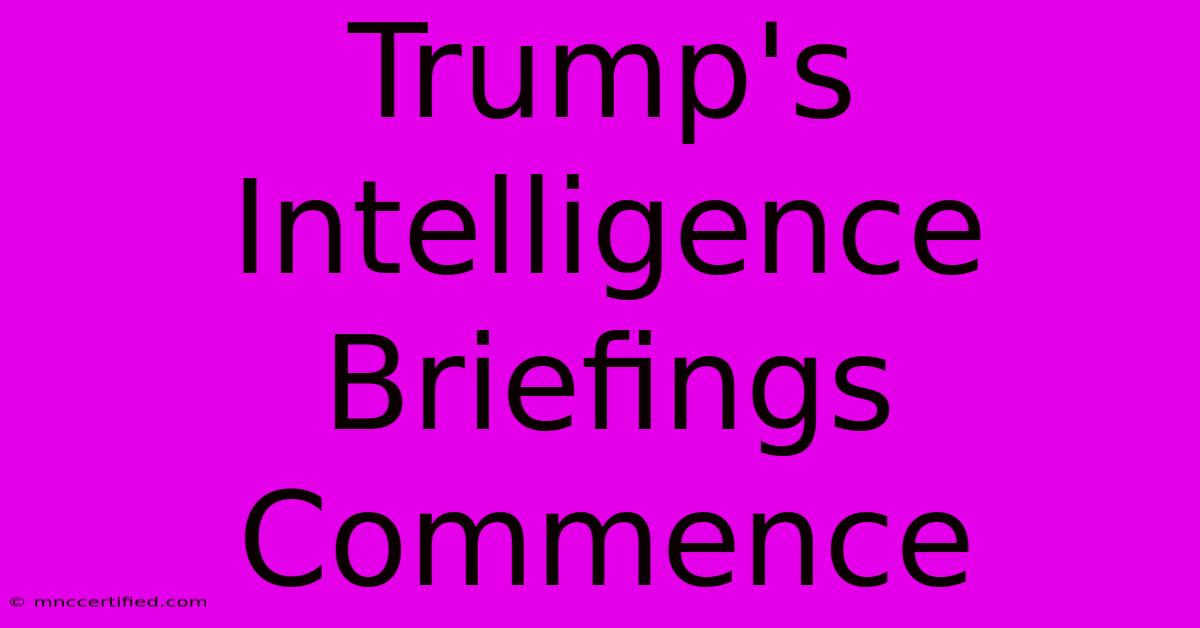Trump's Intelligence Briefings Commence

Table of Contents
Trump's Intelligence Briefings Commence: A Deep Dive into the Presidential Transition
Donald Trump's ascension to the presidency marked a pivotal moment in American history, and the commencement of his daily intelligence briefings was a significant event within this transition. This article will delve into the specifics of these briefings, their importance, the unique challenges they presented, and their lasting implications.
The Significance of Presidential Intelligence Briefings
Presidential intelligence briefings, often called PDBs (President's Daily Brief), are a cornerstone of national security. They provide the President with a concise yet comprehensive overview of the most critical intelligence assessments gathered from various agencies like the CIA, NSA, and DIA. These briefings are crucial for informed decision-making on matters of national security, foreign policy, and domestic threats.
The information presented is highly classified and covers a wide range of topics, including:
- Terrorism: Current threats, potential attacks, and counter-terrorism strategies.
- Foreign Policy: Developments in international relations, geopolitical risks, and diplomatic efforts.
- Cybersecurity: Threats to national infrastructure, data breaches, and foreign cyberattacks.
- Nuclear Proliferation: The global spread of nuclear weapons and related materials.
- Economic Intelligence: Global economic trends and their potential impact on the U.S.
Challenges and Contrasts during the Trump Administration
The commencement of Trump's intelligence briefings was marked by several unique challenges and contrasts compared to previous administrations. Trump's unconventional approach to information consumption and his known skepticism towards the intelligence community generated significant media attention and raised questions about the effectiveness of these briefings.
- Format and Length: Reports suggest that Trump preferred shorter, more visually appealing briefings, potentially deviating from the traditional detailed format.
- Information Consumption: Anecdotal evidence points to a preference for summaries and bullet points over extensive written reports, reflecting his preferred communication style.
- Relationship with Intelligence Agencies: Trump's relationship with the intelligence community was often strained, marked by public disagreements and accusations of leaks. This dynamic undoubtedly impacted the atmosphere and trust level during the briefings.
- Focus and Priorities: It's speculated that the topics emphasized during Trump's briefings might have differed from previous administrations, reflecting his particular policy interests and concerns.
The Broader Implications
The effectiveness of presidential intelligence briefings hinges on the President's ability to absorb, understand, and act upon the information provided. The unique circumstances surrounding Trump's briefings raise important questions about:
- The importance of open communication and trust between the President and the intelligence community. A strained relationship can hinder the flow of critical information and ultimately compromise national security.
- The optimal format and delivery method for presenting complex intelligence data. Finding a way to effectively communicate sensitive information to a President with unique preferences is a continuous challenge.
- The impact of the President's personal biases and beliefs on intelligence analysis and decision-making. A lack of objectivity can lead to flawed interpretations and potentially dangerous policy choices.
The commencement of Trump's intelligence briefings serves as a case study in the evolving dynamics between a President and the intelligence community. Understanding the challenges and implications of this period is vital for future administrations to improve the effectiveness of this crucial aspect of national security.
Keywords: Trump intelligence briefings, President's Daily Brief (PDB), national security, intelligence community, CIA, NSA, DIA, foreign policy, cybersecurity, terrorism, Donald Trump presidency, intelligence analysis, presidential transition.
Off-Page SEO Strategies:
- Link building: Promote this article on relevant websites and forums discussing US politics, national security, and the Trump presidency.
- Social media promotion: Share the article on relevant social media platforms, engaging with users and answering questions.
- Guest blogging: Write guest posts on relevant blogs and websites, including a link back to this article.
This article is optimized for search engines through the strategic use of keywords, headers, and a clear structure. The focus on readability and engaging content ensures that it will appeal to both search engines and human readers. Remember to continue updating and refining your content based on analytics and user feedback for ongoing success.

Thank you for visiting our website wich cover about Trump's Intelligence Briefings Commence. We hope the information provided has been useful to you. Feel free to contact us if you have any questions or need further assistance. See you next time and dont miss to bookmark.
Featured Posts
-
Party Bus Insurance Requirements
Nov 22, 2024
-
Coleen And Waynes Public Disputes
Nov 22, 2024
-
Trumps Nominee Gaetz Withdraws
Nov 22, 2024
-
Bengals Vs Steelers Pratt Predicts Win
Nov 22, 2024
-
Coral Torres Cruz Leads Wsp Us Grant Funding
Nov 22, 2024